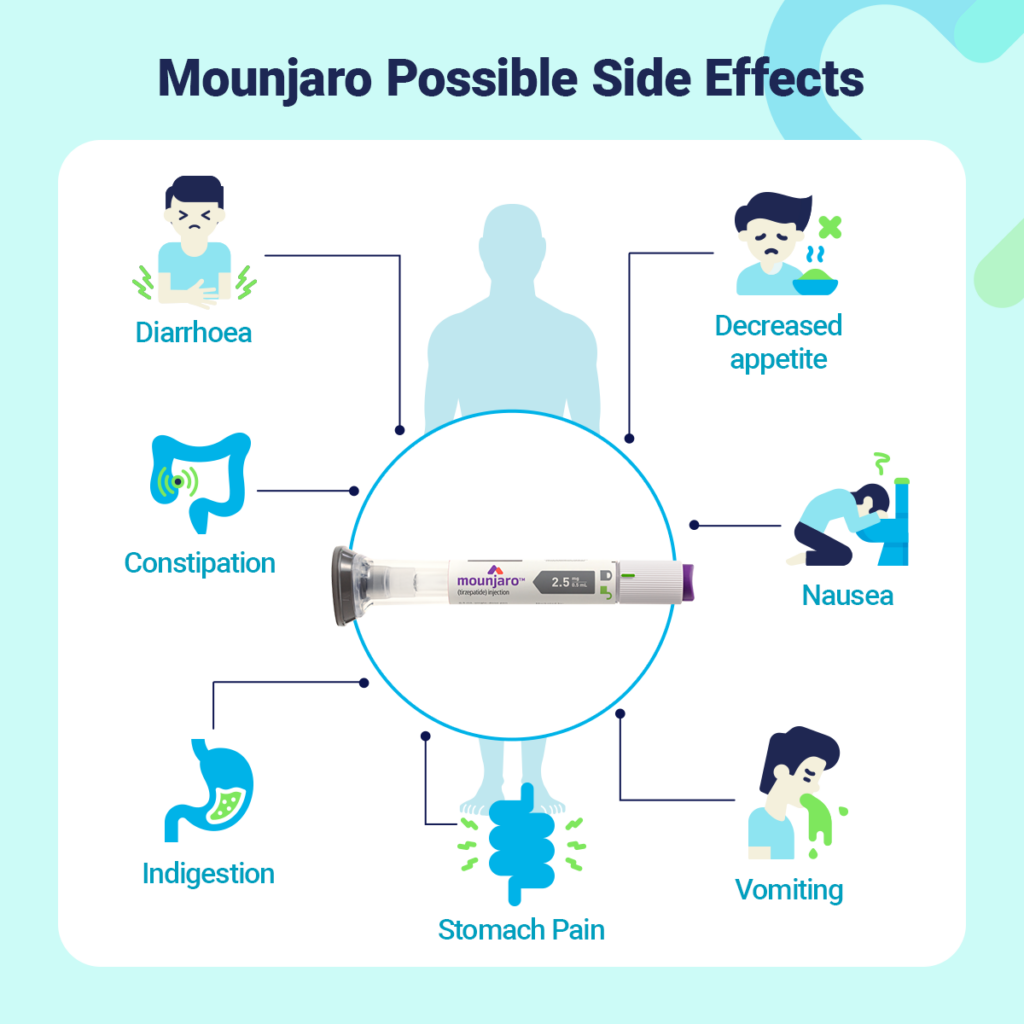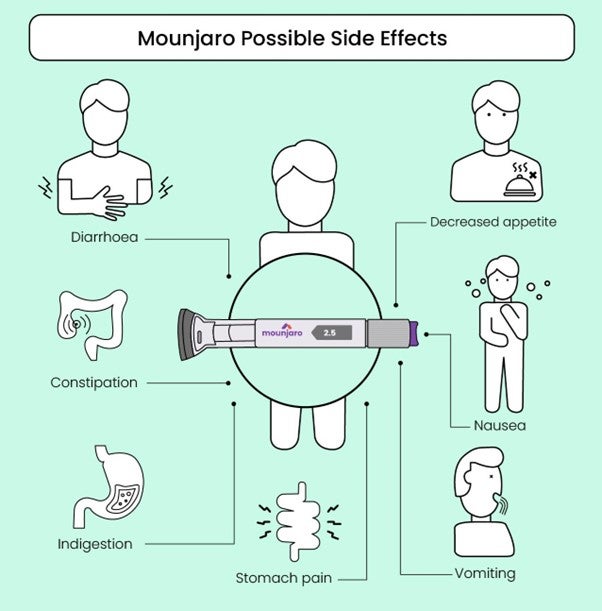How Long Does Mounjaro Side Effects Last? Mounjaro side effects typically last for a few days to a couple of weeks. The duration can vary based on individual factors such as dosage, frequency of use, and overall health.
Mounting concern over the duration of Mounjaro side effects is understandable, as individuals want to be well-informed about the impact of this medication. Whether you are considering Mounjaro or have recently started taking it, understanding the duration of potential side effects is crucial.
We will explore the typical duration of Mounjaro side effects, factors that can influence how long they last, and steps you can take to manage and alleviate these effects. By the end, you will have a comprehensive understanding of what to expect when it comes to the duration of Mounjaro side effects.
Introduction To Mounjaro
Mounjaro is a medication used to treat various conditions.
It is essential to understand the basics of Mounjaro and its effects.
Let’s delve into the details of this commonly prescribed drug.
What Is Mounjaro?
Mounjaro is a prescription medication with specific uses.
It plays a vital role in managing certain health conditions.
Understanding its composition and purpose is crucial.
Why Is It Prescribed?
Mounjaro is prescribed to treat specific medical issues.
Healthcare providers recommend it for its therapeutic benefits.
Knowing the reasons behind its prescription is important.
Common Side Effects Of Mounjaro
When taking Mounjaro, it is important to be aware of the potential side effects that may occur. While not everyone will experience these side effects, it is essential to be informed about them so you can monitor your health and seek medical attention if necessary.
Gastrointestinal Issues
Gastrointestinal issues are one of the common side effects associated with Mounjaro. These issues may include nausea, vomiting, diarrhea, or stomach discomfort. It is important to note that these symptoms are usually mild and temporary, lasting for a few days or weeks.
If you experience any gastrointestinal issues while taking Mounjaro, it is recommended to speak with your healthcare provider. They may be able to provide guidance on managing these symptoms or suggest alternative treatment options if needed.
Injection Site Reactions
Another common side effect of Mounjaro is injection site reactions. This refers to any discomfort, redness, swelling, or itching at the site where the medication is injected. These reactions are usually mild and go away on their own within a few days.
If you notice any severe or persistent injection site reactions, it is important to contact your healthcare provider. They can evaluate the situation and determine if any further medical intervention is necessary.
It is important to remember that while these side effects are common, they do not occur in everyone. Each individual may react differently to Mounjaro, and some may experience no side effects at all. If you have any concerns or questions about the side effects of Mounjaro, it is always best to consult with your healthcare provider.
Duration Of Side Effects
The duration of side effects is a common concern for individuals who take medications, including Mounjaro. Understanding the duration of Mounjaro side effects can help individuals manage their symptoms effectively. Here is a breakdown of the duration of Mounjaro side effects based on their short-term effects and long-lasting impact.
Short-term Effects
Mounjaro is known to cause short-term side effects that typically last for a few hours to several days. These side effects can include nausea, vomiting, headache, dizziness, and fatigue. In most cases, these symptoms tend to resolve on their own without the need for medical intervention.
Long-lasting Impact
While most side effects of Mounjaro are short-term, some individuals may experience long-lasting impacts that can persist for several weeks or months. These side effects can include changes in vision, ringing in the ears, difficulty sleeping, and loss of appetite. If these side effects persist or worsen over time, it is important to speak with a healthcare provider to determine the best course of action.
It is important to note that the duration of side effects can vary from person to person. Some individuals may experience side effects for a shorter or longer duration than others. It is also essential to follow the prescribed dosage and speak with a healthcare provider if any concerns arise regarding the duration or severity of side effects.

Credit: my-bmi.co.uk
Comparing Mounjaro Side Effects With Other Medications
How Long Does Mounjaro Side Effects Last? Mounjaro side effects typically last 2-3 days, shorter than other medications. Understanding the duration can help manage expectations and alleviate concerns. It’s important to consult a healthcare provider for personalized advice.
Mounjaro Vs. Traditional Diabetes Medications
When it comes to managing diabetes, it is crucial to consider the potential side effects of the medications prescribed. Mounjaro is a relatively new medication that has gained popularity in recent years for its effectiveness in controlling blood sugar levels. However, it is essential to compare the side effect profile of Mounjaro with traditional diabetes medications to make an informed decision about treatment options.
Side Effect Profile
Mounjaro offers a promising side effect profile, with minimal adverse reactions reported by patients. Compared to traditional diabetes medications, Mounjaro has shown a lower incidence of common side effects such as nausea, dizziness, and gastrointestinal discomfort. This makes it a preferred choice for individuals who are sensitive to medication or have experienced intolerable side effects in the past.
In addition to its favorable side effect profile, Mounjaro has also been found to have a lower risk of hypoglycemia, a condition characterized by dangerously low blood sugar levels. Traditional diabetes medications often carry a higher risk of hypoglycemia, which can lead to complications if not managed properly. Furthermore, Mounjaro has demonstrated a reduced likelihood of weight gain, an issue commonly associated with traditional diabetes medications. This is particularly beneficial for individuals who are already struggling with weight management or those who wish to avoid potential weight-related complications.
Overall, Mounjaro stands out as a well-tolerated medication with minimal side effects compared to traditional diabetes medications. Its favorable side effect profile, lower risk of hypoglycemia, and reduced likelihood of weight gain make it a promising option for individuals seeking effective diabetes management without the burden of significant side effects.
| Comparison | Mounjaro | Traditional Diabetes Medications |
|---|---|---|
| Common Side Effects | Minimal | Higher incidence |
| Hypoglycemia Risk | Lower | Higher |
| Weight Gain | Reduced likelihood | Potential for weight gain |
In conclusion, Mounjaro offers a promising alternative to traditional diabetes medications with its minimal side effect profile, lower risk of hypoglycemia, and reduced likelihood of weight gain. It is essential to discuss the available options with your healthcare provider to determine the most suitable treatment plan for your diabetes management.
Managing Side Effects
Dietary Adjustments
Consider making dietary adjustments to manage the side effects of Mounjaro. Include foods rich in antioxidants, such as berries, spinach, and nuts, to support your body’s natural detoxification processes. Additionally, prioritize a balanced diet with plenty of fruits, vegetables, and lean proteins to promote overall well-being.
Medical Interventions
Consult with your healthcare provider for potential medical interventions to address persistent side effects. They may recommend specific medications or therapies to alleviate symptoms and improve your comfort during the recovery period.

Credit: www.drugs.com
When To Seek Medical Attention
If Mount Kilimanjaro side effects persist longer than expected, it is advisable to seek medical attention promptly. Monitoring symptoms and consulting a healthcare professional can help address any prolonged discomfort and ensure proper treatment.
Signs Of Severe Reactions
If you experience any of the following signs after taking Mounjaro, it may indicate a severe reaction that requires immediate medical attention:
- Rapid or irregular heartbeat
- Difficulty breathing or shortness of breath
- Severe dizziness or fainting
- Swelling of the face, lips, tongue, or throat
- Hives or a rash that spreads rapidly
These symptoms could be indicative of an allergic reaction or a more serious side effect. It’s crucial to seek medical attention right away to ensure your safety and well-being.
Emergency Situations
In certain emergency situations, it’s important to call for immediate medical help. If you experience any of the following symptoms after taking Mounjaro, do not hesitate to contact emergency services:
- Chest pain or pressure
- Severe headache or confusion
- Sudden weakness or numbness on one side of the body
- Difficulty speaking or slurred speech
- Seizures or convulsions
These symptoms may indicate a life-threatening condition that requires immediate attention. Don’t delay in seeking medical assistance as it can make a significant difference in your outcome. Remember, while Mounjaro may have its benefits, it’s important to stay vigilant and aware of any potential side effects. If you experience any severe reactions or emergency situations after taking this medication, seek medical attention promptly. Your health and safety should always be a top priority.
Patient Testimonials
Discover how long Mounjaro side effects typically last through firsthand patient testimonials. Gain valuable insights into the duration of potential side effects from those who have experienced them firsthand.
Positive Experiences
Patients shared heartwarming stories of quick recovery and renewed energy after using Mountjaro.
- One patient mentioned feeling more alert and focused within a week.
- Another noted improved sleep quality and reduced anxiety after a few doses.
Challenges Faced
Despite the positive feedback, some patients encountered minor side effects that lasted briefly.
- One patient experienced mild nausea for a couple of days.
- Another reported temporary headaches that disappeared after a week.

Credit: www.emed.com
Frequently Asked Questions
How Long Do Mountjaro Side Effects Last?
The duration of Mountjaro side effects can vary depending on the individual and the severity of the symptoms. In general, most side effects tend to subside within a few days to a week after discontinuing the medication. However, some side effects may persist for a longer period of time.
What Are The Common Side Effects Of Mountjaro?
Mountjaro may cause side effects such as nausea, vomiting, headache, dizziness, fatigue, and dry mouth. These are usually mild and go away on their own. However, if these symptoms persist or worsen, it is important to contact your healthcare provider.
What Should I Do If I Experience Severe Side Effects From Mountjaro?
If you experience severe side effects from Mountjaro such as difficulty breathing, chest pain, fainting, or a rash, seek medical attention immediately. These symptoms could be indicative of a serious allergic reaction or other severe side effect.
Can I Take Mountjaro With Other Medications?
Before taking Mountjaro, it is important to inform your healthcare provider about any medications you are currently taking. Some medications can interact with Mountjaro and cause serious side effects. Your healthcare provider can help determine if Mountjaro is safe for you to take with your other medications.
Conclusion
The duration of Mounjaro side effects varies from person to person. It’s important to monitor any symptoms and consult with a healthcare professional. Understanding the potential duration of side effects can help individuals prepare and manage their recovery effectively. With proper care, most side effects should diminish over time.